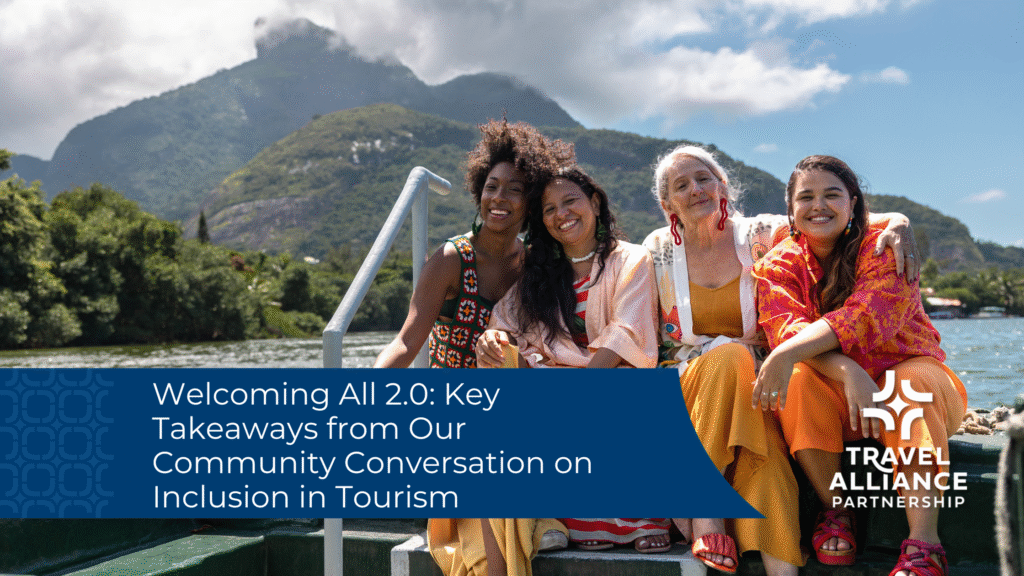Welcoming All 2.0: Key Takeaways from Our Community Conversation on Inclusion in Tourism
In our rapidly evolving travel industry, the concept of being a “welcoming destination” is no longer simply about inviting more visitors. It’s about deeply understanding what it takes to make everyone feel they belong — residents, travelers of all backgrounds, and the very communities that tourism supports.
That’s why, in June, we hosted the second in our series of TAP Community Conversations, this time exploring what “Welcoming All 2.0” looks like today. Together with Roni Weiss, Executive Director of Travel Unity; Karen Kuhl, Executive Director of Cayuga County Tourism in New York’s Finger Lakes; and Lauren Sackett, CEO of the Rhinelander Chamber of Commerce & Visitor Center in Wisconsin, we dug into how DEAI (Diversity, Equity, Accessibility, Inclusion) work is changing, why it’s still essential, and how even small, rural destinations can meaningfully move forward.
Their insights were candid, forward-thinking, and full of practical advice. Here are some of the highlights.

Social Impact Starts at Home: Seeing Tourism Through a Community Lens
One of the strongest themes to emerge was the idea that inclusive tourism doesn’t start with visitors — it starts at home. Karen Kuhl shared how Cayuga County’s journey to center Harriet Tubman’s legacy as the chosen hometown of this American icon required deep introspection first. “Before we did anything outward-facing,” she explained, “we looked inward. We asked who are we to be walking down this lane? We examined our strategic plans, bylaws, and had honest conversations with our board to ensure this was authentic to our community.”
Lauren Sackett echoed a similar perspective from Rhinelander, a rural destination in Wisconsin’s Northwoods. Their work to make trails more accessible and spotlight diverse-owned businesses was driven as much by the needs of their own aging and differently abled residents as by potential visitors. “Tourism isn’t just about bringing travelers in,” Lauren said. “It’s about your community as a whole.”
It’s a powerful reminder: tourism is most resilient when it genuinely serves the people who live there first.
Doing the Work, Even When Words Change
As the term DEAI has become more politically charged, many organizations are grappling with how to keep this work central without alienating funders, partners, or community stakeholders. Karen was frank about the challenges: “The word DEI has become weaponized. We’re learning how to navigate that, to continue the work without always bringing attention that we’re doing the work.”
Roni Weiss, who leads Travel Unity, offered an important distinction: “You can absolutely do the work without ever saying DEAI. But you have to still address the different needs of different groups. If you simply swap in ‘welcoming everyone’ and stop tailoring efforts to actual communities, that’s not doing the work.”
It’s a delicate balance many destinations are facing — protecting funding streams and broad support while staying accountable to the very communities they aim to include.
How Small and Rural Destinations Can Lead
For many in our audience — representing smaller DMOs, attractions, or rural communities — the conversation turned practical. Both Lauren and Karen emphasized that you don’t need a big-city budget to start making a difference.
“Start small, but start somewhere,” Lauren urged. In Rhinelander, this looked like using modest grant funding to enhance their website with filters that allow visitors to find diverse-owned businesses and partnering with Native-led consultants to guide accessibility improvements.
Karen cautioned against pushing all this work into a single committee: “This has to be integrated. It’s in staff job descriptions, board priorities, partner outreach, even our RFPs. It’s everybody’s job.”
She also shared how Cayuga County moved beyond typical visitor metrics to what they call an “impact multiplier,” tracking growth in awareness, influence on future projects, and leadership wins — like being invited to speak on these topics nationally. “That’s ROI for us,” she said, “even if it doesn’t live as a separate line item.”
Lead with Empathy, Not Guilt
Perhaps the most resonant moment came when our panelists talked about the emotional drivers behind this work. “Guilt is not empathy,” Roni said. “If you’re focused on feeling bad about what you can’t do, you’re missing the point — which is to understand others’ experiences and act on what you can do.”
Lauren agreed, describing how they ask themselves: How would someone feel if they truly belonged here? “It doesn’t happen overnight. It won’t look perfect. But empathy has to guide us.”
Karen offered this perspective for organizations just beginning: “Be humble, be honest, be kind, be patient. This isn’t a checklist to move on from — it’s a long-term commitment.”
The Bottom Line: This is Human Work
Inclusion in tourism isn’t just a business strategy — though there’s plenty of data showing it is. It’s also deeply human work. It’s about listening, adjusting, and sometimes having uncomfortable conversations, all in service of building places where more people can see themselves reflected and welcomed.
As we wrapped up, Karen noted that stepping carefully around language can have unintended effects too. “When we pull away from talking explicitly about DEAI, we risk sending the wrong signal to the very communities we’re trying to reach — that maybe this isn’t for them after all.”
Let’s Keep the Conversation Going
At TAP, we believe collaboration and shared learning are what will help our industry not just survive change, but lead through it.
So we’ll leave you with this question:
What’s one small, meaningful way your organization could be more genuinely welcoming this year?
We’d love to hear your thoughts, stories, or questions. And stay tuned for future TAP Community Conversations as we continue exploring explore timely topics, share fresh ideas, and learn from each other – so we can all move forward confidently in a rapidly evolving travel industry.
Author
Related Posts
Themes from ABA 2026 Part 2: Embracing the Experience
In Part 1 of this series, we explored how collaboration has become essential to the future of group travel. Another change that is quickly becoming…
